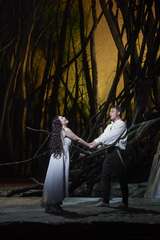|
Back
A Great Night at the Opera Toronto
The Four Seasons Centre for the Performing Arts
10/12/2019 - & October 16*, 18, 20, 22, 24, 26, 2019
Antonin Dvorák: Rusalka, Op. 114, B. 203
Sondra Radvanovsky (Rusalka), Pavel Cernoch (the Prince), Keri Alkema (the Foreign Princess), Stefan Kocán (Vodník), Elena Manistina (Jezibaba), Vartan Gabrielian (Hunter), Matthew Cairns (Gamekeeper), Lauren Eberwein (Turnspit), Anna-Sophie Neher (First Wood Nymph), Jamie Groote (Second Wood Nymph), Lauren Segal (Third Wood Nymph)
The Canadian Opera Company Chorus, Sandra Horst (chorus master), The Canadian Opera Company Orchestra, Johannes Debus (conductor)
Sir David McVicar (director), John Macfarlane (set designer), Moritz Junge (costume designer), David Finn (lighting designer), Christopher Maravich (associate lighting designer), Andrew George (choreographer)

S. Radvanovsky & P. Cernoch (© Michael Cooper)
The Canadian opera Company’s first Rusalka remains a fondly remembered success, but David McVicar’s production (first seen in Chicago in 2014) makes a major leap ahead in many ways.
Pride of place in its success must go to Sondra Radvanovsky whose physical portrayal of the role manages to outshine even her impeccable vocalizing of the tormented heroine. Her recent roles here were queenly - Anna Bolena and Norma - and as Rusalka, a water nymph trying to negotiate terrestrial existence, she is heartbreakingly awkward and gauche. Her portrayal is most affecting during the lengthy stretch when she must remain silent at the royal court when her reactions to what is happening reveal to us a suffering creature while at the same time she remains an enigma to the courtiers.
Choreographer Andrew George deserves a lot of credit for the strange and unsettling atmosphere of the production. The woodland creatures in Acts I and III display a great deal of polymorphous perversity (and the three singing wood nymphs seamlessly join the action). As effective as this is, it is topped in Act II when a disquieting ballet sequence initially captivates with a tutu-and-tights number that morphs into a send-up of a fairytale worthy of the Les Ballets Trockadero. It ends with a fairy having her wings torn off; this is wickedly hilarious but the hilarity is undercut by Rusalka’s distress.
The ballroom scene was preceded by a bustling, realistic kitchen scene, all adding up to the type of lavish spectacle we expect in opera and all to frequently do not get. (Last season’s drab Otello comes to mind.)
There is a second also with glorious tone and presence: Keri Alkema as the Foreign Princess, capturing the right degree of thwarted entitlement. (Let’s face it, she is the logical choice for the Prince - but if logic ruled there would be no drama.)
Pavel Cernoch has exactly the right voice for the Prince, despite brief moments of strain. Elena Manistina relishes every moment as Jezibaba, while Stefan Kocán eloquently voices Vodnik’s anguish.
There are also good parts for members of the COC’s Ensemble Studio, all of whom do well: Vartan Gabrielian as the Hunter, Matthew Cairns as the Gamekeeper, and Lauren Eberwein as the Turnspit.
As in Turandot the chorus is augmented to excellent effect. Johannes Debus brings forth the full sensuousness and colour of Dvorák’s score. The troupe of 10 dancers deserves kudos as well. All in all, a great night at the opera.
Michael Johnson
|